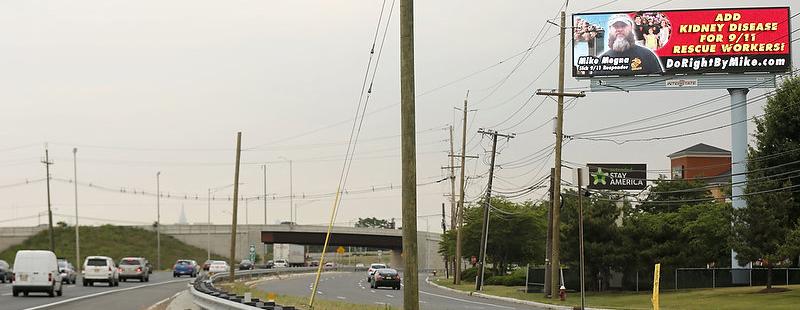Mike Megna, 44, a Marine veteran and retired Pompton Lakes police officer, responded to the September 11th terrorist attacks, along with his brothers, to locate their father, a Port Authority police officer. After locating their father, the brothers stayed at Ground Zero to aid rescue and recovery efforts and assist in the bucket brigade. After 9/11, Megna continued to volunteer at Ground Zero for three weeks, while there was still hope of locating survivors.
In 2007, Megna, began urinating blood which led to chronic anemia. After a number of tests, his physicians were at a loss- all they knew was that a substance produced by his bone marrow was attacking his kidneys.
Eventually, Megna was forced to go on disability, which led to financial issues. Megna defaulted on his mortgage and is now facing foreclosure. Megna applied to the 9/11 Victim Compensation Fund in the hope of receiving compensation for his kidney disease. For years, Megna was able to keep the bank at bay by assuring them he would be able to pay the mortgage with money received from the 9/11 Victim Compensation Fund.
Earlier this year, after a biopsy by the Veterans Administration, Megna’s condition was diagnosed as “Monotype atypical anti-GBM nephritis.” Unfortunately, the 9/11 Victim Compensation Fund denied Megna’s claim because his disease, which was recognized by the Mayo Clinic as an illness just three months ago, is not a covered condition. As explained in recent blog posts, in order to be eligible for compensation, a claimant must suffer from an illness included on the World Trade Center Health Program‘s list of covered conditions. At this time, the only kidney condition covered is cancer or malignant neoplasm (except renal pelvis).
In order to be considered by the World Trade Center Health Program, research must show not only that the condition in question has a higher incidence rate among individuals exposed to 9/11 toxins, dust, and debris, but also that there is a causal relationship between such exposure and development of the condition in question. A non-cancer condition may be proposed for coverage by the World Trade Center Health Program either by Administrator Dr. John Howard’s own discretion or upon a petition filed by an interested party. For example, Dr. Howard recently received a petition to add peripheral neuropathy to the list of covered conditions after a study at Winthrop University Hospital showed individuals exposed to WTC dust were fifteen times more likely to report neuropathic symptoms than those who were not exposed. However, among other reasons, the petition was denied because the survey sample size of 255 was considered too small. In denying the petition, Dr. Howard explained the process as follows “Where the available evidence has the potential to provide a basis for a decision, the scientific and medical evidence is further assessed to determine whether a causal relationship between 9/11 exposures and the health condition is supported. A health condition may be added to the List if published, peer reviewed, direct observational or epidemiologic studies, as appropriate, provide substantial support for a causal relationship between 9/11 exposures and the health condition in 9/11-exposed populations.”
Meeting the World Trade Center Health Program standards would be difficult because the Mayo Clinic has reported only twenty documented cases. Megna’s nephrologist at the Mayo Clinic, Dr. Stephen B. Erickson, informed him that he has a rare variation of a rare disease. In an effort to defy the odds, Megna has taken out two billboards in New Jersey stating “Add Kidney Disease for 9/11 Rescue Workers,” with his website.
Dr. Howard declined to comment on the story, but Christina Spring, spokeswoman for the National Institute of Occupational Safety and Health (NIOSH), which administers the World Trade Center Health Program, commented “We have to follow the process that was put in place by Congress. Some conditions will take decades to show up.”
For more information, contact Pitta & Baione LLP at info@pgbllp.com or 844-982-2667.



